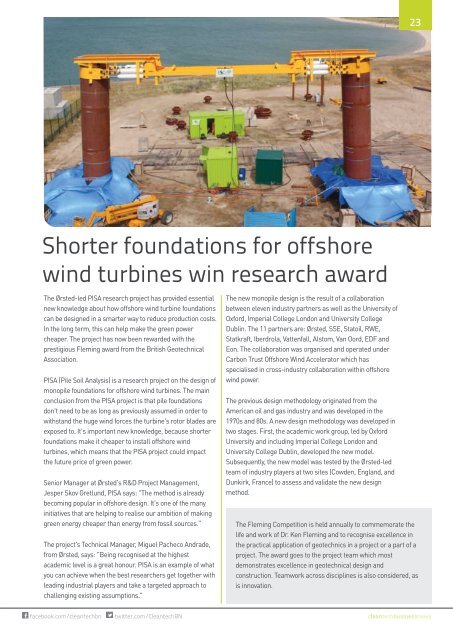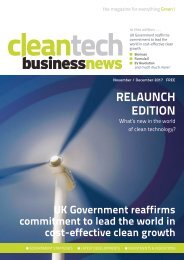Cleantech Business News JanFeb18
You also want an ePaper? Increase the reach of your titles
YUMPU automatically turns print PDFs into web optimized ePapers that Google loves.
23<br />
Shorter foundations for offshore<br />
wind turbines win research award<br />
The Ørsted-led PISA research project has provided essential<br />
new knowledge about how offshore wind turbine foundations<br />
can be designed in a smarter way to reduce production costs.<br />
In the long term, this can help make the green power<br />
cheaper. The project has now been rewarded with the<br />
prestigious Fleming award from the British Geotechnical<br />
Association.<br />
PISA (Pile Soil Analysis) is a research project on the design of<br />
monopile foundations for offshore wind turbines. The main<br />
conclusion from the PISA project is that pile foundations<br />
don't need to be as long as previously assumed in order to<br />
withstand the huge wind forces the turbine's rotor blades are<br />
exposed to. It's important new knowledge, because shorter<br />
foundations make it cheaper to install offshore wind<br />
turbines, which means that the PISA project could impact<br />
the future price of green power.<br />
Senior Manager at Ørsted's R&D Project Management,<br />
Jesper Skov Gretlund, PISA says: "The method is already<br />
becoming popular in offshore design. It's one of the many<br />
initiatives that are helping to realise our ambition of making<br />
green energy cheaper than energy from fossil sources."<br />
The project's Technical Manager, Miguel Pacheco Andrade,<br />
from Ørsted, says: "Being recognised at the highest<br />
academic level is a great honour. PISA is an example of what<br />
you can achieve when the best researchers get together with<br />
leading industrial players and take a targeted approach to<br />
challenging existing assumptions."<br />
The new monopile design is the result of a collaboration<br />
between eleven industry partners as well as the University of<br />
Oxford, Imperial College London and University College<br />
Dublin. The 11 partners are: Ørsted, SSE, Statoil, RWE,<br />
Statkraft, Iberdrola, Vattenfall, Alstom, Van Oord, EDF and<br />
Eon. The collaboration was organised and operated under<br />
Carbon Trust Offshore Wind Accelerator which has<br />
specialised in cross-industry collaboration within offshore<br />
wind power.<br />
The previous design methodology originated from the<br />
American oil and gas industry and was developed in the<br />
1970s and 80s. A new design methodology was developed in<br />
two stages. First, the academic work group, led by Oxford<br />
University and including Imperial College London and<br />
University College Dublin, developed the new model.<br />
Subsequently, the new model was tested by the Ørsted-led<br />
team of industry players at two sites (Cowden, England, and<br />
Dunkirk, France) to assess and validate the new design<br />
method.<br />
The Fleming Competition is held annually to commemorate the<br />
life and work of Dr. Ken Fleming and to recognise excellence in<br />
the practical application of geotechnics in a project or a part of a<br />
project. The award goes to the project team which most<br />
demonstrates excellence in geotechnical design and<br />
construction. Teamwork across disciplines is also considered, as<br />
is innovation.<br />
facebook.com/cleantechbn<br />
twitter.com/<strong>Cleantech</strong>BN<br />
cleantechbusinessnews



